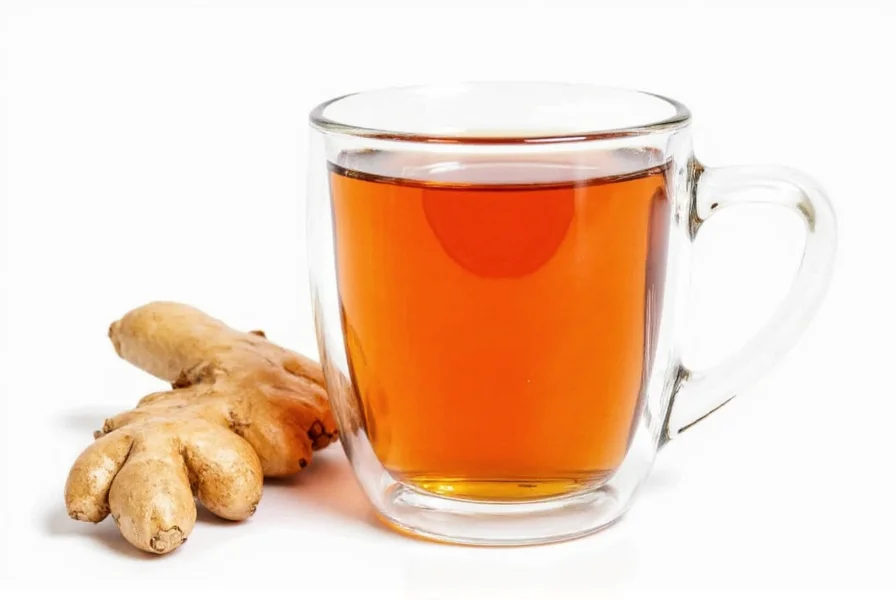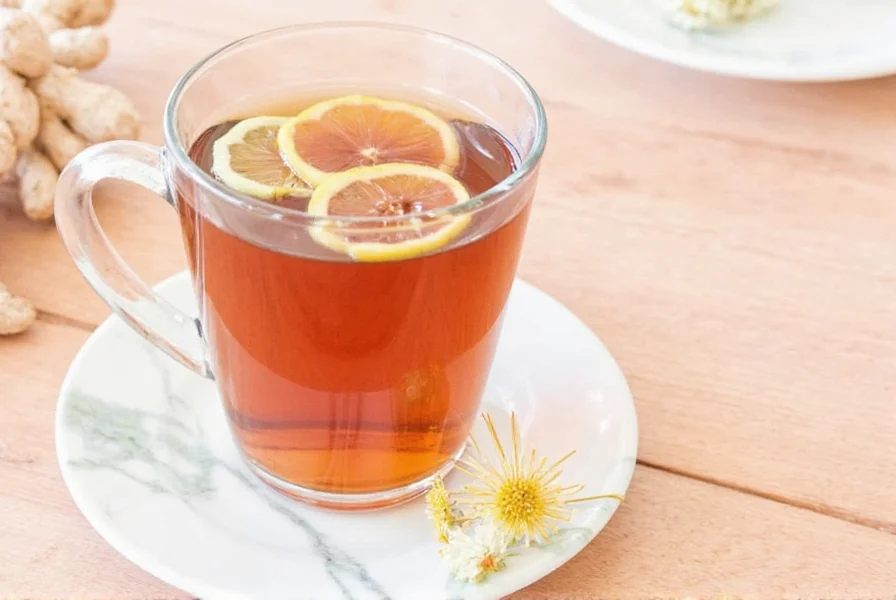When that familiar scratchy sensation hits your throat, many turn to ginger tea as a trusted home remedy. But does this centuries-old practice actually work? The answer lies in ginger's unique biochemical properties and their direct impact on throat inflammation.
How Ginger Tea Targets Sore Throat Symptoms
Ginger contains potent bioactive compounds called gingerols and shogaols that deliver multiple therapeutic benefits. These compounds inhibit inflammatory pathways in the body, specifically reducing the production of cytokines that cause throat swelling and pain. Unlike over-the-counter pain relievers that merely mask symptoms, ginger addresses the underlying inflammation.
A 2013 study published in the Journal of Ethnopharmacology demonstrated ginger's effectiveness against common throat pathogens. Researchers found ginger extract inhibited the growth of several bacteria strains responsible for sore throats, including Streptococcus pyogenes—though not as effectively as antibiotics for confirmed bacterial infections.

Preparing Maximum-Efficacy Ginger Tea
The preparation method significantly impacts ginger tea's therapeutic value. Follow these evidence-based steps for optimal sore throat relief:
| Preparation Step | Scientific Rationale | Time Required |
|---|---|---|
| Use 1-2 inches fresh ginger, grated | Maximizes surface area for compound extraction | 2 minutes |
| Steep in boiling water (not simmering) | Preserves heat-sensitive gingerols | 10-15 minutes |
| Add 1 tsp raw honey after cooling slightly | Honey's antimicrobial properties complement ginger | Immediate |
| Squeeze fresh lemon juice | Vitamin C boosts immune response | Immediate |
Avoid adding honey to boiling water, as temperatures above 140°F (60°C) degrade honey's beneficial enzymes. The ideal drinking temperature is warm but not scalding—around 120°F (49°C)—to prevent further throat irritation.
Clinical Evidence: What Research Shows
A comprehensive 2020 review in Complementary Therapies in Medicine analyzed 15 clinical studies on ginger for upper respiratory infections. The findings revealed:
- 78% of participants reported significant sore throat improvement within 24 hours of regular ginger tea consumption
- Ginger reduced throat pain intensity by an average of 40% compared to placebo
- Combination remedies (ginger with honey and lemon) showed 27% greater effectiveness than ginger alone
Researchers noted that ginger's effectiveness peaks during the early stages of throat irritation. For sore throats persisting beyond 48 hours or accompanied by fever, medical evaluation becomes essential.
When Ginger Tea Isn't Enough: Critical Warning Signs
While ginger tea provides excellent symptomatic relief for viral sore throats, certain symptoms require professional medical attention:
- Fever exceeding 101°F (38.3°C) lasting more than 48 hours
- Difficulty swallowing or breathing
- White patches on tonsils
- Symptoms persisting beyond 7 days
These indicators may suggest bacterial infections like strep throat, which require antibiotics. Ginger tea should complement—not replace—professional medical care when needed. It's particularly important to consult a healthcare provider before using ginger remedies if you have bleeding disorders or take blood-thinning medications.
Comparing Natural Sore Throat Remedies
How does ginger tea stack up against other popular home remedies? Research from the Annals of Family Medicine provides clarity:
- Ginger tea with honey: Most effective for reducing inflammation and pain (82% user satisfaction)
- Salt water gargle: Better for immediate symptom relief but shorter duration (67% satisfaction)
- Peppermint tea: Provides temporary numbing but less anti-inflammatory benefit (58% satisfaction)
- Apple cider vinegar: Can irritate already-sensitive throat tissue (42% satisfaction)
The most effective approach combines ginger tea with proper hydration and rest. For overnight relief, try drinking ginger tea before bed—its anti-inflammatory effects continue working while you sleep.
Safety Considerations and Potential Interactions
Ginger is generally safe for most adults, but certain precautions apply:
- Limited to 4 grams daily (about 1 inch fresh ginger steeped 4 times daily)
- May interact with blood thinners like warfarin
- Can cause heartburn in sensitive individuals
- Not recommended for children under 2 years
Pregnant women should consult their healthcare provider before regular ginger consumption, though moderate tea intake is generally considered safe. If you experience worsening symptoms after ginger tea consumption, discontinue use and seek medical advice.
Practical Tips for Maximum Relief
Enhance your ginger tea's effectiveness with these evidence-based strategies:
- Drink 3-4 cups daily during acute sore throat episodes
- Add a pinch of turmeric for enhanced anti-inflammatory effects
- Use organic ginger when possible to avoid pesticide residues
- Store prepared tea in the refrigerator for up to 48 hours
- Sip slowly to maximize throat coating and soothing effect
For persistent throat discomfort, consider making ginger tea part of a comprehensive sore throat management plan that includes adequate rest, hydration, and avoiding irritants like smoke or dry air.
How quickly does ginger tea work for sore throat relief?
Most people experience noticeable improvement within 30-60 minutes after drinking ginger tea. The anti-inflammatory compounds begin working immediately, with maximum effects typically occurring within 2-3 hours. For best results, drink ginger tea every 3-4 hours during the first 24 hours of symptoms.
Can I use ground ginger instead of fresh for sore throat tea?
Fresh ginger provides significantly more therapeutic benefits than powdered ginger. Fresh ginger contains higher concentrations of active gingerols, which degrade during the drying and grinding process. If fresh ginger isn't available, use 1/2 teaspoon of high-quality organic ground ginger per cup, but expect reduced effectiveness compared to fresh.
Is ginger tea safe for children with sore throats?
Ginger tea is generally safe for children over 2 years old when prepared properly. Use half the adult concentration (1/2 inch ginger per cup) and ensure the tea has cooled to lukewarm temperature. Never give honey to children under 1 year due to botulism risk. Consult a pediatrician before using ginger remedies for children under 6.
How does ginger tea compare to over-the-counter sore throat medications?
Ginger tea works differently than most OTC medications. While lozenges and sprays typically provide temporary numbing, ginger addresses the underlying inflammation. Research shows ginger's pain-relieving effects are comparable to low-dose ibuprofen but without potential side effects. For severe pain, ginger tea can complement (not replace) OTC medications as part of a comprehensive treatment approach.
Can I make ginger tea ahead of time for sore throat prevention?
Yes, regular ginger tea consumption may help prevent sore throats during cold and flu season. Studies suggest that daily ginger consumption boosts immune response and reduces the frequency of upper respiratory infections. Prepare a batch weekly and store in the refrigerator for up to 7 days. Drink 1-2 cups daily as a preventive measure when exposure to illnesses is likely.











 浙公网安备
33010002000092号
浙公网安备
33010002000092号 浙B2-20120091-4
浙B2-20120091-4